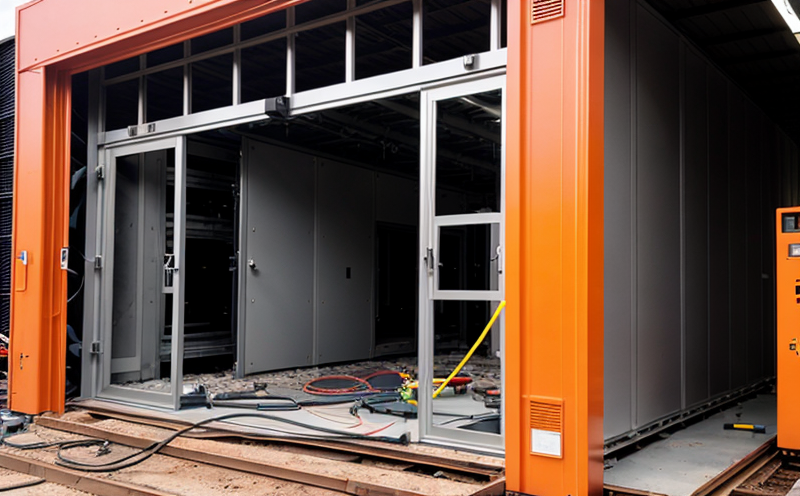BS EN 61960 Thermal Safety Testing of Secondary Lithium Batteries
The BS EN 61960 standard is crucial for ensuring the thermal safety of secondary lithium batteries. This testing method aims to identify potential hazards associated with battery overheating, which could lead to thermal runaway and subsequent fires or explosions.
Thermal safety in secondary lithium batteries is critical due to their widespread use across various sectors including automotive, electronics, and medical devices. Non-compliance can result in severe consequences for both consumers and manufacturers alike. This standard provides a framework for testing that ensures the battery’s ability to withstand extreme conditions without compromising safety.
The BS EN 61960 test involves subjecting batteries to specific thermal stresses designed to simulate real-world scenarios such as overcharging, short circuiting, and mechanical abuse. The primary objective is to determine whether the battery can maintain its integrity under these conditions. If a fault occurs during testing, it must be contained within the battery casing without causing external damage or posing risks to personnel.
The standard specifies detailed procedures for conducting tests on both individual cells and complete battery packs. These include pre-test preparations like charging protocols, initial temperature settings, and specimen conditioning times. During the test itself, controlled heating methods are employed until predefined temperature thresholds are reached or exceeded. Post-test analysis focuses on evaluating cell performance metrics such as internal resistance changes, voltage variations, and visual inspections for signs of damage.
At Eurolab, we employ state-of-the-art equipment and highly experienced engineers to conduct these rigorous tests according to BS EN 61960 guidelines. Our facilities are equipped with specialized chambers capable of simulating diverse environmental conditions necessary for accurate assessment. By adhering strictly to the standards outlined in this document, our clients can rest assured that their products meet stringent safety requirements.
Our comprehensive approach ensures not only compliance but also enhanced reliability and longevity of secondary lithium batteries used across various industries. With Eurolab’s expertise in this area, you gain peace of mind knowing your product is safe and meets global regulatory expectations.
- Evaluation of thermal stability
- Detection of potential faults before they cause harm
- Containment of any issues within the battery casing
- Comprehensive analysis post-test to ensure integrity remains intact
By partnering with Eurolab for your BS EN 61960 thermal safety testing needs, you benefit from our deep understanding of this critical area and commitment to delivering accurate results. Let us help protect your brand reputation by ensuring robust compliance with international standards.
Eurolab Advantages
At Eurolab, we pride ourselves on offering unparalleled service and support tailored to meet the unique needs of our clients. Our expertise spans multiple disciplines including chemistry, physics, biology, materials science, and engineering - all focused around providing reliable solutions for quality assurance and product development.
- State-of-the-art facilities: Equipped with cutting-edge technology that allows us to perform precise measurements and analyses.
- Experienced professionals: Our team consists of highly skilled experts who bring years of experience in their respective fields.
- Dedicated resources: We allocate dedicated personnel, equipment, and infrastructure specifically for each project ensuring maximum efficiency.
- Customized solutions: Every client receives customized services designed to address specific challenges they face during product development or quality assurance processes.
We understand that every organization has different requirements; hence we take the time to listen carefully before recommending appropriate testing methods and strategies. Our goal is always to exceed expectations by delivering high-quality results promptly.
Why Choose This Test
The BS EN 61960 thermal safety test for secondary lithium batteries plays a vital role in ensuring the reliability and safety of these energy storage devices. Here are some key reasons why choosing this particular test is beneficial:
- Regulatory compliance: Adhering to international standards such as BS EN 61960 helps businesses stay compliant with relevant regulations, avoiding potential legal issues.
- Risk mitigation: By identifying and addressing possible thermal hazards early in the product lifecycle, companies can significantly reduce risks associated with battery failures.
- Enhanced reputation: Demonstrating commitment to safety through rigorous testing enhances a company's reputation among consumers and stakeholders alike.
- Improved design: Insights gained from comprehensive testing allow manufacturers to refine their designs for better performance, longer lifespan, and increased efficiency.
In today’s competitive market, where consumer trust is paramount, conducting thorough thermal safety tests like those specified in BS EN 61960 becomes essential. It not only protects end-users but also strengthens brand loyalty and fosters innovation within the industry.
Environmental and Sustainability Contributions
Conducting BS EN 61960 thermal safety tests on secondary lithium batteries contributes positively towards environmental protection and sustainability efforts. By ensuring that these powerful energy storage devices operate safely under extreme conditions, we minimize the risk of accidents or incidents that could result in hazardous waste generation.
- Reduction in landfill: Properly tested batteries have a longer useful life, reducing the amount sent to landfills where they would otherwise contribute to pollution.
- Eco-friendly production: Compliance with stringent safety standards encourages manufacturers to adopt cleaner manufacturing practices, thereby lowering overall environmental impact.
- Resource conservation: Longer-lasting batteries mean fewer replacements needed over time, conserving precious resources used in battery manufacturing processes.
- Promotion of recycling: Reliable testing promotes the responsible disposal and recycling of old or damaged batteries, preventing them from entering incinerators where they might release harmful substances into the atmosphere.
Through our rigorous adherence to BS EN 61960 standards, Eurolab plays an important role in fostering sustainable practices throughout the entire lifecycle of secondary lithium batteries. This commitment aligns with broader goals aimed at promoting cleaner technologies and more efficient resource utilization worldwide.





